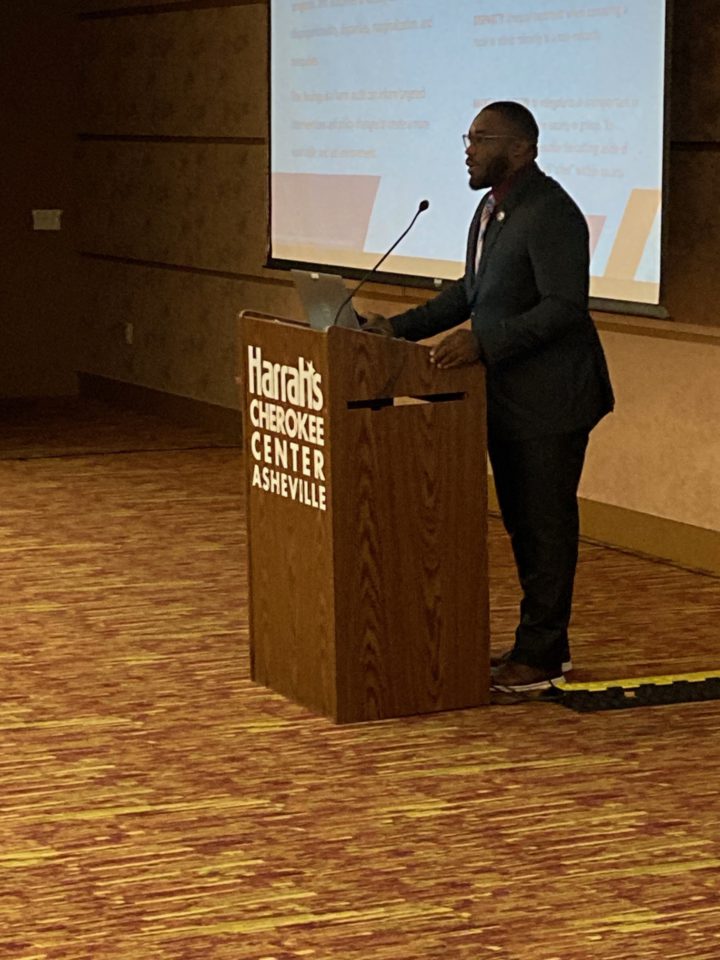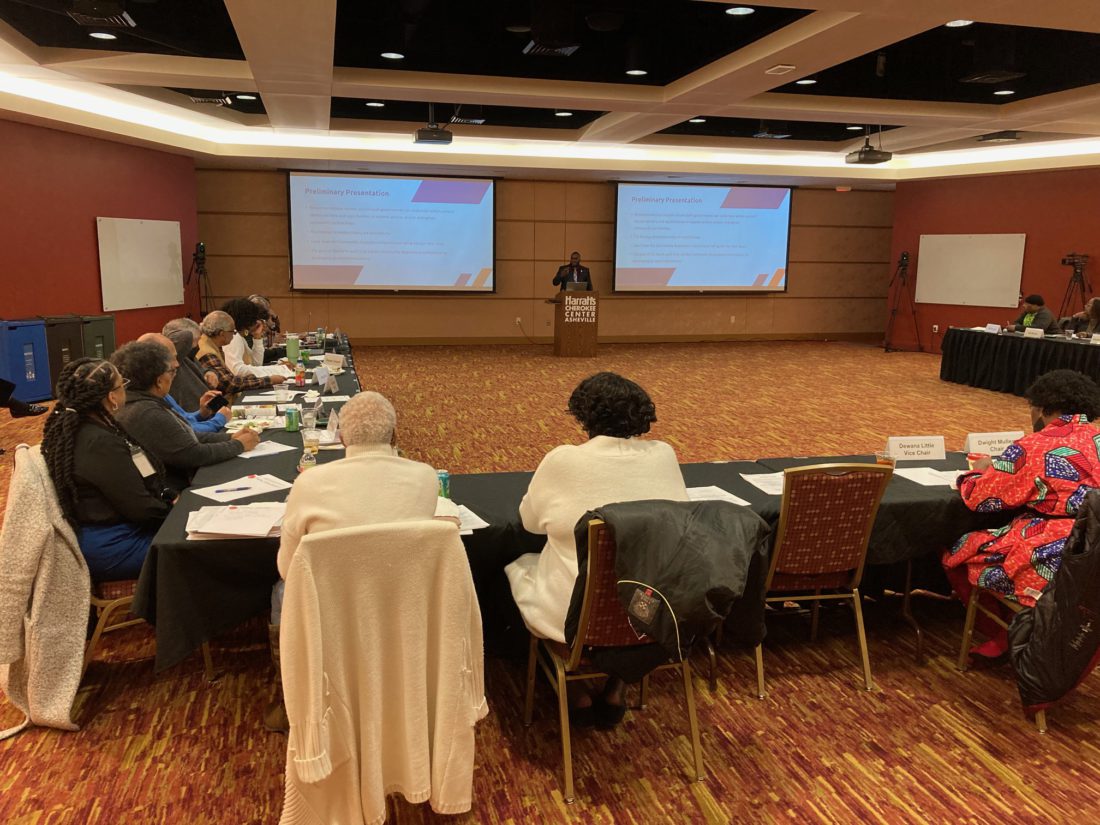(Editor’s note: This story was updated Feb. 19 to correct a mistake initially reported in the Carter Development Group’s presentation. According to research conducted for the Cease the Harm Audit, 72% of those living in public housing communities in Asheville are Black, says Adrian Carter.)
The independent firm charged with reviewing the City of Asheville and Buncombe County governments for harm caused to Black residents presented its preliminary findings to the Community Reparations Commission on Jan. 22.
The Stop the Harm Audit’s key overall findings revolve around the availability of data, equity training, affordable housing and hiring practices, according to the presentation by Adrian Carter, project lead and founder of the Carter Development Group.
“We know that this is the first known audit of this nature funded by a municipal and county government,” Carter said. “And so what we’re really doing is we’re baselining. This audit ends up serving as a baseline for us to grow from as you look to implement different strategies for the cessation of harm.”
Asheville became one of the first municipalities in the nation to pass a reparations resolution in July 2020 and, in partnership with Buncombe County, established a 25-member commission in March 2022. The commission contracted with Carter Development Group in December 2022 for about $174,000 to perform an audit of internal and external services for both the city of Asheville and Buncombe County. Members aimed to ensure that the cessation of harm to the Black community has occurred and confirm that local governments are in compliance with relevant federal and state laws, according to the contract.
Two of the group’s key findings were related to the collection of data that could help monitor an organization’s equitable practices. Carter said there were “insufficient data-driven practices” to determine the level of participation of Black residents in opportunities and funds provided by the city and county.
Carter acknowledged the lack of data was partly because this type of process has never been done before but stressed that in order to ensure equitable access to various program funds, data is vital.
“How can you assess representation?” he asked. “How can you ensure access? How can you ensure knowledge if you’re not collecting the data to be able to measure that to begin with?”

Carter also highlighted local governments’ lack of “wide-scale racial equity training” for everyone in their ranks, rather than just leaders, to ensure that there is an understanding of racial equity across the board.
Carter said the area’s well-documented limited affordable housing supply also has an outsized impact on Black people and said his firm focused on what the governments were doing to increase that supply.
Additionally, a “subjective interpretation of human resources’ hiring and promotion processes has enabled covert, latent and explicit biases,” he said.
The presentation was framed around a “cease-harm audit compass” anchored by four pillars: opportunity, representation, knowledge and access. Carter organized his critiques of government processes around how missing pillars can create inequity in a community. Opportunity minus representation creates disproportionality, for example, while knowledge minus access creates exclusion, he said.
Throughout the presentation, Carter stressed the importance of focusing on solutions, not the problems that need to be solved.
“It’s not the problem that counts,” he said repeatedly, prompting the commission to respond in unison: “It’s the solution.”
Focus area findings
Ultimately, Carter said his group held 18 meetings across government departments, collected and reviewed 1,000 artifacts and developed 70 recommendations across seven focus areas. Those areas included the CRC’s own five focus areas: economic development; education; health and wellness; housing; and criminal justice, plus a review of the governments’ internal workforces and departments of equity, inclusion and human rights.
In economic development, after reviewing purchase order data, Carter found that Buncombe County had a “persistent utilization of repeat vendors, limiting opportunities for minority-owned businesses,” as noted by Adrienne Hibbert of the Carter Development Group.
However, the county has not had a disparity study done to specifically show how public funds have been spent along demographic lines, something Hibbert recommended.
Hibbert also recommended the city and county establish a utilization and industry dashboard that would show how money is spent in contracts with government agencies, so local businesses could better access and potentially apply for government contracts. Plus, establishing a Black Chamber of Commerce could help Black businesses pool resources and promote entrepreneurship within the community, she said.
In education, CDG’s Jennifer Felton suggested it is unclear if money spent to close the racial opportunity gap is working, suggesting that the money may need to be applied in different ways.
One of the most alarming statistics shared during the meeting came during a discussion of housing. Citing U.S. Census data, CDG’s Beverly Cooper said Black median household income in Asheville and Buncombe County is about $22,000 compared with about $70,000 for their white counterparts.
Similarly, 37.8% of Black residents own a home compared with 69.6% of white residents in Asheville, where rent is also the highest of all major cities in the state, said Cooper, who presented the housing portion of the presentation. Of those living in public housing communities, 72% are Black, leading to disproportionate issues of access to healthy food and other resources.
Cooper said local governments should prioritize increasing affordable housing supply, including by targeting developers focused on the lower end of the income spectrum. A joint strategic housing plan involving the city, county, housing authority and other stakeholders could help the community develop collective strategies to this end, she said.
After this preliminary presentation, Carter said his firm would hold meetings with city and county staff to review the findings before finalizing recommendations in the next month and a half. Its contract formally ends April 30. The final audit report is meant to provide guidance to the reparations commission for its own final recommendations to the city and county.
Racial Justice Coalition seeks partnership with CRC
At the end of the meeting, the Racial Justice Coalition, an independent alliance that “seeks to achieve and sustain deep equity by building power to those historically underrepresented,” according to its website, made a presentation asking reparations commissioners to work with it to help increase engagement with the process in the city’s public housing projects.
RJC has been advocating for reparations since its founding in 2014, said Ty Johnson, community engagement director for RJC.
“I would just like to remind the commission that the reason why we were in the streets is because of that 72% of the population that is residing in public housing,” said Rob Thomas, executive director of the RJC. “And we really need to bring them into this process to realize the work that you all have done but also give them voice and agency. I don’t feel like they’ve really been involved, and they have not been engaged at all.”
Thomas made it clear that the RJC simply wanted to partner with the reparations commission to help increase engagement efforts with the lower-income segments of the community and wasn’t asking for any money.
“We’re just trying to collaborate with you all,” he said. “I didn’t think we’ve asked for any money. We’ve been doing this for months. We have a report. They just finished and would love to share the results with you about what the public housing community has to say.”
The next reparations commission meeting is scheduled for Monday, Feb. 19.




Black residents make up 13 to 18% of the city and county population respectively, yet they are given more than 50% of subsidized housing. Black residents have been given priority in low income housing and government funded programs for decades. Asheville and Buncombe County also donate (give grant money) to organizations that primarily serve the black community. How much of this is taken into consideration when saying that black residents are treated unfairly? Shouldn’t the city and county grant money that’s being distributed to nonprofit organizations that serve black community be deducted from the reparations fund?
I have no idea what figures someone is giving you, but Buncombe is roughly 6% black. Even if you count all mixed race persons as black that would only add around 2%.
So, for $174,000 we got a report that says no similar reports exist so it’s really a baseline. That’s a typical consultant report. Mr. Carter followed up with the we’re going to need a lot more data to carry this further. Ah, dampen expecations and then float the appeal for more work and more $.
That’s the problems with commissions like this. We all know it is going to accomplish nothing (most early suggestions from the group are patently illegal) but how can the thing be turned off politiclly?
The primary goal of many on the Reparations Commission was that this would lead to individual monetary awards. Former City Councilmember (and angry person) Keith Young is one of the leading advocates. The building mural on Haywood Street conveys it all: “Write the check”.
Even if you subscribe to the concept of individual monetary awards (which I do not), logistical/fairness issues with that approach are manifold and untenable. After estalishing the Commission, the City had to “walk back” those expectations for monetary awards via statements from City Attorney Bradham as not being allowed by current law (indy499’s comment about illegality).
As an engaged citizen, I have kept informed of the commission’s work via meeting summaries they provide to those interested. For me, it has been painful to see how this project has devolved into what I can only describe as “a solution looking for a problem”. That is to say, the only thing the commission has succeeded in doing is asking (demanding) more data to prove their thesis correct. The “Stop the Harm Audit” was their data seeking action.
In my view, America has well turned the corner with regards to “systemic” racism. All one has to do is look around to see the large number of black/african americans that have achieved notable positions of responsibility/authority and wealth. The Asheville City Manager and three on City Council are proof of this claim right here in “racist Asheville”. The same evidence can be seen in virutally every city, state and federal government around the country as well as in major corporations and businesses.
Continued cries of inequity and systemic racism are now being rightly viewed by most as a counterproductive victimization mentality, which ” has never lifted any peoples to a higher level of being. That is because “being a victim” consumes much of one’s energy (usually via anger) and blocks one’s openess for possibilities that exist all around. Victims require others to make their lot better, as opposed to taking it on themselves.
As stated above, what may have been a “nice and politically correct” idea to form this Reparations Commission (you know, provide a voice) has turned into an ongoing request for more data and now, institutional programs for more data gathering to prove something that no longer exists in the kind of significant way of the past.
Political leaders that initiated all of this now have the dilema of how to end it in some face-saving way.
Excellent comments. The constant harping on race has made so many minorities give up their agency by falling into perpetual victimhood. So much time and money wasted on shaming white people instead of shoring up their own community betterment -prioritizing strong families who value education and hard work. Blacks need to clean up their own houses before demanding more from ours. They’re a small fraction of the population yet take a disproportionate chunk of resources. Most people are on board with equal opportunity but not endless special subsidy by skin color.
Enough!